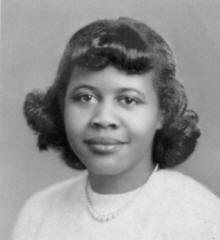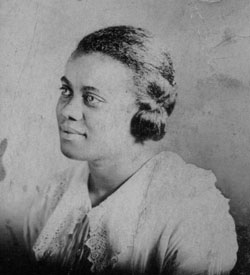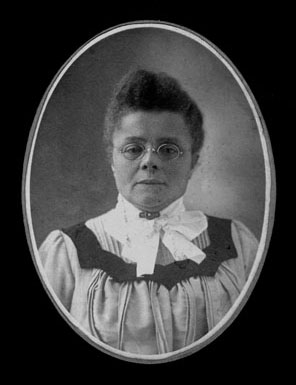
www.snohomishwomenslegacy.org |
| WLP Story Number 16 ~ |
By Teri Baker Don’t try to stereotype Marian Harrison. It just won’t work. She’s a woman, she’s black and she’s a senior, but belonging to three “categories” prone to discrimination has never stopped her from making her own way in the world or, from being a positive influence in the lives of others. Marian Norwood, the second child of Glenna and George Norwood Jr., was born in Everett in 1931. The family home was located on State Street. The Norwood family traded their home for a farm of 62 acres near Arlington on the Jordan Road. Marian was eighteen months old at the time. A second son was born while they lived on the farm. Her mother and father divorced, but her mother stayed on the farm for seven years. “At least with the farm, we could always eat,” Marian says. “We never had money, but we weren’t ever poor.” |
 |
She attended Catholic school for awhile, went back to Marysville High School in tenth grade, graduated in 1949 and then attended the University of Washington for a few months. She married Lyman Lewis and had a son her husband never got to see. “Before I knew it,” she explains, “I was the 19-year-old widow of the Korean War.”
 Glenna Barton (Courtesy
Marian Harrison) Glenna Barton (Courtesy
Marian Harrison) |
Much of her
children’s success can be attributed to the love,
determination and perseverance Marian personifies. “There
are no welfare moms in this family,” Marian states. “My
mother, Glenna Barton, was a college graduate. She came here
from Normal, Illinois with a degree in home economics. After
we kids were grown, she went to nursing school at Old Edison
Tech in Seattle and became one of the first LPNs (Licensed
Practical Nurses) at Veteran’s Hospital in Seattle.” And so, Camp Fire and Cub Scout leader and PTA member Marian did what had to be done to help her children succeed. “When my son went to college, I went to college,” she says. “I got a special degree at Everett Community College and went to work at Arlington High for eight years as a teacher’s aide, then transferred into custodial because they got a man’s wage. So I worked in that for 14 years.” |
| Marian has also been politically active since
attending her first Democratic caucus in 1984. She has worked on at least 30
campaigns, has been a national delegate to the Democratic Convention, was chair
of the 10th District Democrats and currently chairs the 38th
Legislative District Democrats. She is also a member of the League of Women
Voters. In addition, Marian has a well-developed interest in history, particularly her own family’s. As a child she would visit her great-grandmother Louisa Donalson’s store on the east end of Everett Ave. Mrs. Donalson had been born a slave and along with her second husband and family came to Everett from Abbeville, South Carolina before 1900. Louisa Donalson was a founding member of Everett's Second Baptist Church. Marian's grandfather, George Norwood worked in the woods at Granite Falls because black were not allowed to work at local mills. She searched tax records, business directories, newspapers and family photographs and discovered her own father, George W. Norwood, Jr., served in World War One. She also learned about her family’s history as far back as the Civil War. “I hated history as a kid,” Marian says. “I didn’t care about elephants that went over the Alps. Now look at me. I’m involved in history all the time.” |
 Louisa Donalson, Marian's great grandmother (Courtesy Marian Harrison) |
Even with all this volunteering, Marian still finds time to enjoy her 11 grandchildren, be active in church, root for the Seattle Mariners and go to the symphony. She loves music and was a member of Everett Chorale until a car crash in 1994 broke several of her bones, including her spine, taking her five-foot-six frame to four-foot-eleven. But she hasn’t let even that become an excuse to sit back and become idle either.
How could anyone dare stereotype such a woman!
© 2005 Theresa (Teri) A. Baker All Rights Reserved